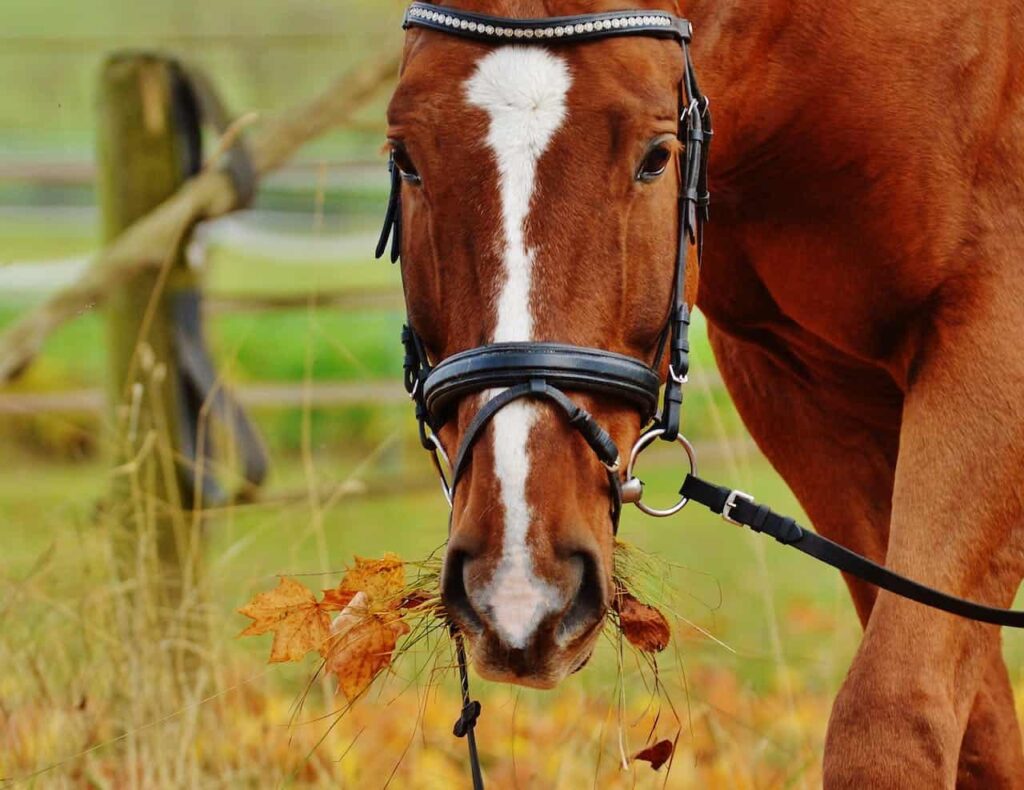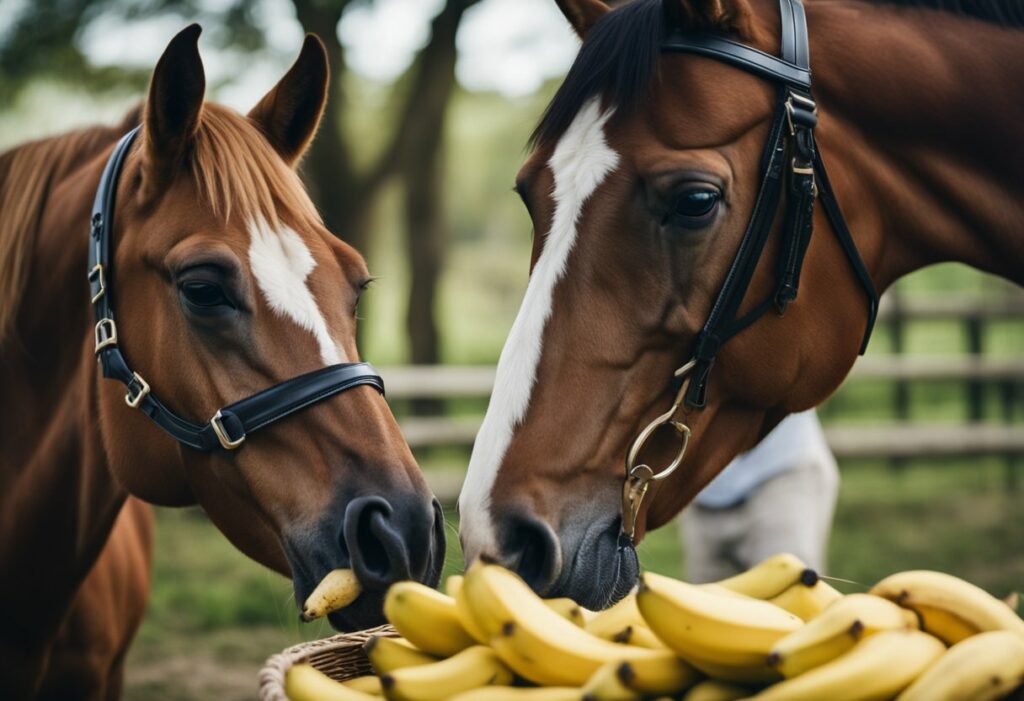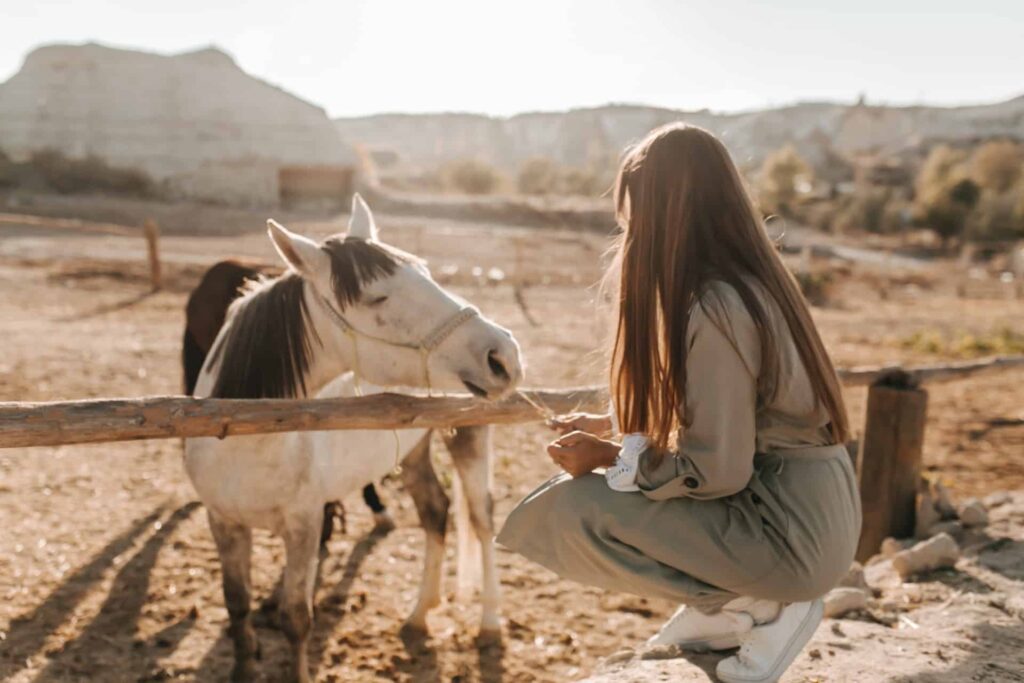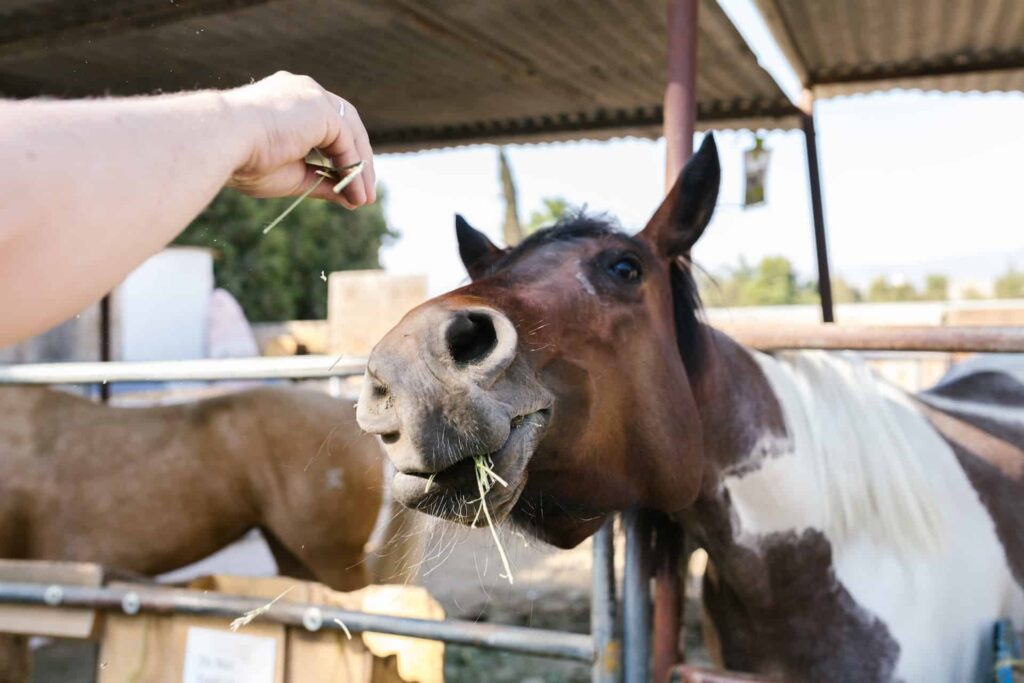Bananas can be a nutritious treat for horses, offering essential nutrients that can complement their regular diet. As herbivores with specific dietary needs, horses require a balanced diet that is high in fiber and has appropriate levels of carbohydrates, proteins, vitamins, and minerals. Can horses eat bananas? In small quantities, bananas can provide horses with additional potassium, an important electrolyte that supports muscle function and overall health.
When considering adding bananas to a horse’s diet, it is crucial to adhere to safe horse feeding practices. Each horse’s dietary requirements can differ based on their size, age, activity level, and health. Therefore, it’s advisable to introduce any new treat, such as bananas, gradually and in moderation to prevent digestive upset or other potential risks and side effects. It’s also important to ensure that the horse’s primary diet remains predominantly composed of forage and to consult with a veterinarian or equine nutritionist for personalized advice.
Key Takeaways
- Bananas are a suitable treat for horses, containing valuable nutrients.
- Safe feeding practices are important when introducing bananas to a horse’s diet.
- Modifying a horse’s diet should be done with consideration to their individual needs.
Equine Nutrition Essentials
Horses require a balanced diet that includes a combination of hay, oats, grass, along with a variety of fruits and vegetables to fulfill their nutritional needs. The diet should provide necessary nutrients like carbohydrates, protein, fats, vitamins, and minerals.
- Hay: Serves as a primary source of fiber and is fundamental for digestive health.
- Oats: Often offered for their high-energy content and ease of digestion.
- Grass: Supplies natural fiber and nutrients when horses graze.
It is important to integrate fruits and vegetables cautiously. Horses can consume bananas, including the peels, which offer potassium – they should be fed as treats and not as staple dietary items. The inclusion of fruits and vegetables should not exceed a sensible portion of the total diet to avoid digestive upset.
The equine diet must be rich in fiber to support a healthy gut, alongside adequate protein for muscle maintenance and repair. A horse’s specific dietary requirements may vary based on age, weight, activity level, and overall health. Therefore, it’s important to consult with a veterinarian or an equine nutritionist to tailor a diet that supports the individual horse’s needs.
When considering new foods, introduce them gradually to monitor for any adverse reactions. A sudden change in diet can lead to health issues such as colic. Proper nutrition is crucial, so feeding must be consistent and appropriate for the horse’s lifestyle.

Understanding a Horse’s Dietary Needs
To ensure the health and well-being of horses, it is necessary to understand not only what they can eat but how their nutritional needs can be optimally met. This encompasses a balance of vitamins, minerals, and appropriate food portions tailored to the individual needs of equine animals.
Role of Vitamins and Minerals in Equine Health
Horses require a complex array of vitamins and minerals to maintain their health. Vitamin B6 and Vitamin C, for instance, are critical for proper metabolism and overall physiological functions. Minerals like magnesium, phosphorus, and calcium play vital roles in nerve transmission, muscle contraction, and building strong bones. A veterinarian or equine nutritionist can provide tailored advice to make sure that all dietary requirements are met to support horse health.
- Magnesium: Necessary for enzyme function, energy metabolism, and muscle relaxation.
- Phosphorus: Works in conjunction with calcium to support skeletal health.
- Calcium: For strong bones and teeth, as well as muscle function.
Importance of Moderation in Feeding Treats
While horses enjoy treats such as fruits, it’s crucial to offer them in moderation to prevent health issues. Excessive treats for horses, especially those with high sugar levels, can lead to obesity, insulin resistance, and metabolic disorders. For instance, hyperkalemic periodic paralysis (HYPP), an inherited condition found in some horses, can be exacerbated by high potassium levels in bananas. Therefore, treats should be given sparingly as part of a well-balanced diet.
Specific Needs of Different Horses
Each horse is an individual with specific dietary needs varying with age, activity level, and health condition. Senior horses, for example, may have different requirements due to changes in digestion and energy needs. Equine with health conditions such as insulin resistance or HYPP require specialized diets to manage their conditions effectively. Always consult with a vet to design a diet that’s suitable for a horse’s unique nutritional needs.
- Senior Horses: Often require diets with easily digestible fiber and added vitamins.
- Equine with Insulin Resistance: Benefit from low-sugar diets to manage energy levels.
- Horses with HYPP: Need low-potassium diets to avoid triggering symptoms.
Related: How Much Does It Cost to Feed a Horse?
Benefits of Bananas for Horses
Feeding bananas to horses offers a variety of health benefits due to their high nutritional value, including vitamins, minerals, and energy-providing carbohydrates. Appropriate consumption can also support their digestive health.
Nutritional Value of Bananas
Bananas are a rich source of nutrients for horses, providing essential vitamins and minerals. They contain significant levels of Vitamin C, Potassium, and Vitamin B6, all important for the horse’s overall health. Bananas are also an excellent source of dietary fiber, which can aid in digestion and gut health.
- Vitamins: Vitamin B6, Vitamin C
- Minerals: Potassium
- Fiber: Good source
- Sugars: Naturally occurring
Bananas as a Source of Energy and Vitamins
Bananas provide horses with natural sugars, which can be converted into energy. This makes them an ideal choice for a healthy treat that can help sustain energy levels during periods of work or training. The Vitamin B6 in bananas is crucial for the metabolism of proteins and the formation of red blood cells, while Vitamin C is an antioxidant that helps protect the body against damage from free radicals.
Promoting Digestive Health with Bananas
The dietary fiber in bananas is beneficial for a horse’s digestive system, helping to prevent issues like constipation. The fiber content facilitates regular bowel movements and can contribute to the prevention of stomach ulcers and gastric ulcers—common problems in stabled horses. The natural antioxidants in bananas may offer further benefits for maintaining a healthy gut environment.

Safe Feeding Practices
When introducing bananas to a horse’s diet, understanding safe feeding practices is crucial, including preparation, portion control, and recognizing signs of allergies.
Preparing Bananas for Horses
Bananas should be offered to horses in a form that is easy to chew and digest. Wash the bananas thoroughly, especially if they are not organic, to remove any pesticide residues. The banana peel, though generally safe for consumption, should be checked for bruises or damage, and it can be removed if there is concern over potential contaminants.
Appropriate Portion Sizes and Frequency
Moderation is key to feeding horses bananas. Horses enjoy bananas, but like any treat, they should not replace the regular diet of hay or grass.
- Portion Sizes: A single banana can be a suitable portion size.
- Frequency: Introducing bananas up to once or twice a week should not disrupt their regular dietary routine.
Consulting with a veterinarian can offer guidance on specific portion sizes appropriate for individual horses.
Awareness About Potential Allergies
Although allergic reactions to bananas in horses are rare, it’s crucial to observe the horse closely after introducing bananas for the first time. Signs of an allergic reaction may include hives, itchiness, or swelling. If any symptoms of an allergy or illness appear, discontinue feeding bananas and consult a vet to determine the cause. Taking these precautions aids the health and safety of the horse while enjoying this treat.
Potential Risks and Side Effects
While bananas can be a tasty treat for horses, introducing this fruit into their diet must be done with caution. Owners should be aware of the potential risks and side effects, such as choking hazards, excessive sugar and calorie intake, and issues arising from the fruit’s high potassium levels which can affect horses with certain medical conditions.
Choking Hazards and How to Avoid Them
Bananas can pose a choking hazard, especially if they are fed in large pieces or to horses that tend to gulp their food. To reduce this risk, bananas should be sliced into small, manageable pieces. Horse owners should always supervise their horses while they’re eating bananas to intervene in case of choking.
Risks of Excessive Sugar and Caloric Intake
Bananas are high in sugar, which can contribute to weight gain and obesity in horses if fed in large quantities. Horses that are insulin resistant or diabetic should have their banana intake strictly monitored or avoided, as the natural sugars can lead to spikes in sugar levels and subsequently disrupt their insulin management.
Conditions Aggravated by High Potassium Levels
High potassium levels in bananas may trigger hyperkalemic periodic paralysis (HYPP), an inherited condition in certain breeds of horses. Affected horses can suffer from muscle trembling, weakness, or even collapse. If a horse has HYPP, a veterinarian should be consulted before adding bananas to its diet. Horses with this condition require a low-potassium diet to avoid triggering adverse side effects.
Alternatives to Bananas and Variety in Diet
While bananas can be a healthy treat for horses, offering a variety of safe fruits and vegetables can contribute to a well-balanced diet. It’s crucial to ensure treats are given in moderation to maintain a horse’s overall health.
Incorporating Other Safe Fruits and Vegetables
Horses can enjoy a range of fruits and vegetables as part of their diet. Safe options include:
- Apples: They are a favorite among many horses and can be fed in moderation.
- Carrots: Rich in nutrients and a crunchy snack that horses often appreciate.
- Pears: Should be given sparingly due to their higher sugar content.
Avoid feeding items like onions, potatoes, and tomatoes, as these can be harmful to horses.
Healthy Treat Options for Horses
When it comes to healthy treats, it’s important to consider the horse’s individual dietary needs. Organic treats can be a good option, ensuring the absence of unwanted pesticides. Here are some examples:
- Commercial horse treats: Many of them are designed to be both nutritious and appealing to picky eaters.
- Banana peels: May be offered as a treat, though confirm they are organic to avoid pesticide residue.
Understanding the Role of Treats in a Well-Balanced Diet
Treats should complement a horse’s diet, not replace it. A well-balanced diet typically consists of forage, such as hay or grass, and may be supplemented with grains and a mineral lick. Treats, whether a sweet treat like a slice of banana or a crunchy carrot, should be just that—treats given occasionally and:
- Not exceed more than 10% of the horse’s total diet.
- Always introduced into a horse’s diet gradually to prevent digestive upset.
Remember, while fruits like bananas can be part of a horse’s diet, the key is moderation.
Frequently Asked Questions
Bananas are often considered as treats for horses, but owners must understand the proper ways to feed them and recognize the associated risks.
Are bananas a safe treat for horses?
Yes, bananas are generally safe for horses to consume in moderation. They provide essential nutrients that can be beneficial to a horse’s diet.
Is it possible for horses to consume the peels of bananas?
Horses can eat banana peels; however, they should be washed to remove any pesticides or chemicals. It’s important to introduce peels gradually to their diet to avoid any digestive issues.
What is the appropriate serving size of bananas for a horse?
A horse can typically have one or two bananas a few times a week as a treat. It is crucial to consider the overall diet and individual health of the horse when determining serving size.
What fruits should be avoided in a horse’s diet?
Certain fruits, such as avocados, are toxic to horses and should be avoided. Persimmons can cause intestinal blockage, while seeds and pits from fruits like apples and cherries can pose a choking hazard or contain harmful substances.
Can horses safely eat other parts of a banana plant?
While horses may safely nibble on other parts of the banana plant, such as the leaves, these are not commonly included in their diet and should be given in limited amounts.
What are the potential risks of feeding horses bananas?
Overfeeding bananas can lead to excess sugar consumption, which might contribute to obesity or dental problems. Horses with metabolic issues should have a restricted sugar intake, including the sugars found in bananas.
Last Updated on November 30, 2023 by Nate Dewsbury



